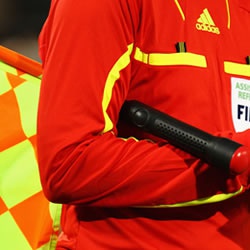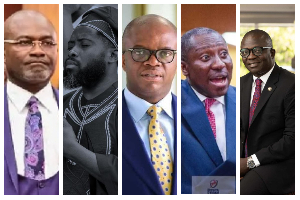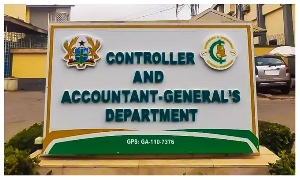This has been a long-standing problem bedeviling Ghana football. Day in and day out, after league matches are played, you hear lots of stories about poor performances from referees.
Clubs on the receiving end will complain about certain decisions given against them and the allegations always centre on money changing hands.
The situation got so bad that a few years ago, Ghana Football Association President Kwesi Nyantakyi, addressing a gathering of referees, remarked that the knights of the whistle should “take the money and do the right thing.”
To this day, even though such incidents have reduced in terms of the number of alleged cases that come up, it is still prevalent today.
Let me begin by saying that it makes no sense whatsoever for clubs to dole out monies to referees for many reasons.
Most clubs find it so hard to make ends meet and as a result, in the case of Premier League clubs, rely heavily on whatever sponsorship revenue that comes in.
In the case of Division One League clubs, it is even worse as currently, there is no sponsorship for the league. For instance, if clubs find it so difficult to pay player salaries, settle camping fees and pay match winning bonuses for example, what sense does it make for clubs to pay money to referees to influence the outcome of matches?
Couldn’t the money have been used to either settle outstanding bills or motivate players? For instance I am aware of a football match a few years back that saw one club hand over GH¢15,000 to the other club with the intention of “buying” the match to avoid relegation.
Unfortunately for the “buying” club, its players were very poor and a goal was conceded. Despite every effort of the “selling” club to create chances for the “buying” club to equalize and score the winner, but the match ended 1-0.
So the “buying” club demanded the money it paid out after the game and received it. The “buying” club was even lucky that the money had not been used because such a transaction is akin to using counterfeit money to buy weed. There are no records or receipts of such transactions.
The point I am making here is simple. Failure to motivate players will mean that even if $1 million is paid to either clubs or referees to influence the outcome of matches, it is equivalent of flushing one’s life savings down the toilet. In short, it makes no sense at all.
I am reliably informed that the average going rate for “buying” a referee is between GH¢5000 and GH¢8000 a league match. So assuming without admitting that each club does such a transaction at least five times in a season, we are talking of a minimum expenditure of GH¢25,000 a season.
For first division clubs, the new season’s kick off has been delayed for a couple of weeks because most clubs have not paid the required officiating and affiliation fees.
Despite the difficulties in honouring such payments, you will find that some of the clubs will find money to influence the outcome of matches towards the back end of the season and especially during the Middle League playoffs.
A recent Middle League match was fraught with allegations that a match referee had pocketed GH¢20,000 to influence the match’s outcome.
So how was the money raised in the first place and why was it that such an amount of money was not used to motivate the players, not to mention paying essential bills and fees like I have outlined above? Clearly, as clubs we are on a hiding to nothing and things need to change.
I have written before that paying realistic salaries to players is doable when clubs decide to stop paying the lump sum known as enticement fees to players and rather spread the money over the length of contracts for the players in question.
In the same sense, monies earmarked for ways and means, as well as match referees should also be channeled towards the efficient running of clubs in this country.
Too often, clubs employ individuals who may not actually be cut out for the job but are self-seeking persons who would even go to the extent of acting as middle men during such transactions.
What normally happens is that such a person will tell his club’s chief executive that influencing a referee for a particular match will amount to GH¢7,000 when the actual figure is GH¢5000.
The middle man, who would sometimes occupy a position at the club, thus pockets a cool GH¢2000 and the worst part is that the person could also ask the referee for a cut of the GH¢5000 he is paying out.
Greed is the order of the day and all this should tell clubs that it makes no sense whatsoever to pay out such monies. I am even reliably informed that some referees are on the payroll at some clubs and this is simply unacceptable!
As I have mentioned earlier on, such actions could also demotivate players when they are aware that the club that owes them salaries for months on end can find such monies to influence referees. Do you honestly think that such players will give off their best on the field of play? Certainly not!
So my appeal to clubs is simple: stop paying such monies to referees and concentrate on building capacity at your clubs.
You will find that paying such monies only amounts to cutting your nose to spite your face
Let clubs focus on what is really important, embrace sportsmanship and educate their fans on the fact that a match has three outcomes; a win, a loss or a draw. Let all clubs come out and say a big no to paying referees and Ghana football will be all the better for it.
Soccer News of Sunday, 27 October 2013
Source: christopher opoku/footy-ghana.com
Comment: Why clubs should say no to bribing referees













